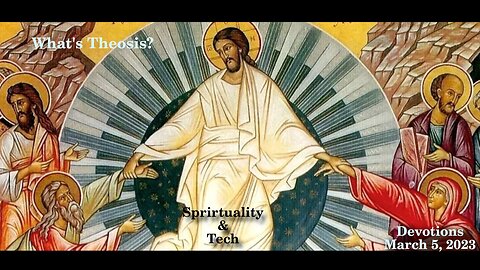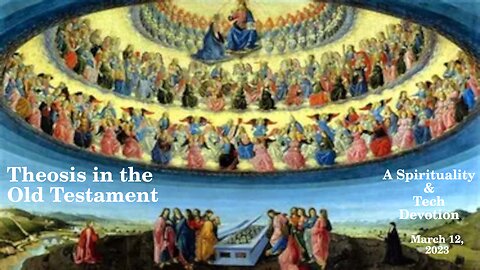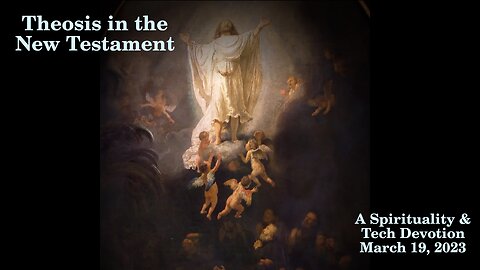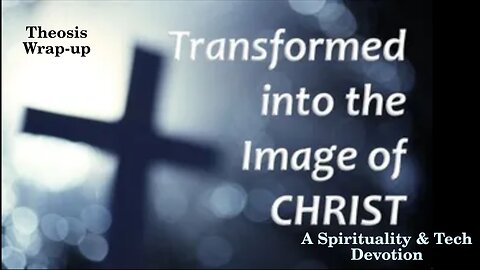What's Theosis? Week 1
Theosis in the Old Testament
Theosis 3: Theosis in the New Testament
What’s Theosis, Anyway?
Theosis in the Old Testament
Father, as we seek for hints as to who you meant us to be, be with us. Guide our hearts and our minds as we look at these Psalms today. Help us to understand who we are, so that we can be truly humble, cross-shaped, sacrificial lovers of you and others. Holy Spirit, be present with us today. Jesus, come and remind us of who you are that we might emulate you. In Jesus’ name,
Amen
So the only passages that I could find relatively easily that suggest humanity’s true nature are in the Psalms. That means that they are poetry, so take them for what they are. We will read sections from Psalm 8 and 82 this morning, and I will try to show that they support the idea (indirectly, mind you) of theosis. Feel free to flame me in the comments, call me a heretic or a proof-texter. Let’s have a conversation. Anyway, back to the passages at hand. (all passages are from The Passion Translation)
Psalm 8:4-6
Why would you bother with puny, mortal man
or care about human beings?
Yet what honor you have given to men,
created only a little lower than Elohim,
crowned with glory and magnificence.
You have delegated to them
rulership over all you have made,
with everything under their authority,
placing earth itself under the feet of your image-bearers.
Psalm 82:6-7
Didn’t I commission you as judges, saying,
‘You are all like gods, since you judge on my behalf.
You are all like sons of the Most High, my representatives.’
Nevertheless, in death you are nothing but mere men!
You will be laid in the ground like any prince and you will die.”
Taken together, these passages paint an interesting picture, don’t they? Psalm 8 opens with ecstatic praise to God for the splendor and glory of creation, then questions in v 5 why God would value us, when there are so many larger, more powerful, more majestic things that He made. Yet, we are just a little lower than Elohim (God) in the created order. Not lower than angels, for how can a lower being accurately judge one that is above it? (1 Corinthians 6:3) If it is the case, as Paul says, that we will judge the angels, then we must have greater authority and status than they do. If we are above the angels, but just a little lower than God himself, then we truly do have the right to judge all things, as Psalm 82 suggests. God gave us discernment and wisdom. He created us to partake in His nature, to fully partner with Him, but we asserted our own will, our own pride over realizing that truth. How is it that we have this delegated authority, that we are just a little lower than Elohim? We have been made in the very image of God. That topic has taken many great theologians many books to try to sort out, and I find most of their solutions incomplete at best, not that I would pretend to know better or to have a better solution or definition at the moment. Suffice to say, for now, that for our purposes here, relationality is the aspect of the imago Dei that I am leaning on. That is the necessary assumption, and seems to be the basis of this theosis and deification language in the East. If we are like God, then how are we like God? Clearly we are finite and He is infinite, so that cannot be it. He is Spirit, and we have a spirit, so that could be a part of it. We seem to have three parts which are nigh inseparable (Body, Soul, and Spirit, in community with one another... We see David talking to his soul in a handful of places in the Psalms), and God is three persons, Father, Son, and Holy Spirit (in Eternal, Perfect Community). That could be a part of it. We also exist in 3 clusters of relationship, God & Us, Us Among Ourselves, and Us & the World. Threes seem to matter. So that relationality is what I am after. God made us in His image, and because of that, we have the right to steward the world, the responsibility to care for one another, and the capacity for relationship and communion with Him. These passages establish those things for us, and we need that foundation to look at what theosis is in the New Testament next week.
This week’s memesplanations will seek to support that with some patristic thought, and some verses, but more of that will actually come the week after next, after which we will wrap this series up. After that, we will shift to a more liturgical focus, with Palm Sunday, Holy Week, and Resurrection Sunday.
-
 3:30
3:30
Caleb Hammer
19 hours ago40 Year Old Is Stuck Paying Off His Girlfriends Credit Cards
12.6K13 -
 23:23
23:23
TudorDixon
18 hours agoForgiving Dems Will Be Happy To Replace Biden/Harris | The Tudor Dixon Podcast
20.6K8 -
 19:29
19:29
ScammerRevolts
14 hours agoHe Tried To Scam Me... So I Reset His Phone
10.9K4 -
 16:08
16:08
RealitySurvival
1 day agoTop 12 Things Preppers Should Teach Their Children!
19.6K1 -
 13:21
13:21
World Nomac
14 hours agoExtreme Bungee Jump in AlUla Saudi Arabia 🇸🇦
24.2K3 -
 2:47:57
2:47:57
Fresh and Fit
10 hours agoMost Embarrassing Rejections Women Have Faced... w/ SNEAKO
121K163 -
 3:30:25
3:30:25
Akademiks
10 hours agoHappy. Birthday Kendrick Lamar. Kodak Black robbed Stevewilldoit? Sosa Returns to CHIRAQ. Carti OTW?
81.2K31 -
 1:22:53
1:22:53
Steve-O's Wild Ride! Podcast
4 days ago $0.28 earnedDoes Gene Simmons Regret Humping Thousands Of Chicks? - Wild Ride #219
39K40 -
 33:55
33:55
Athlete & Artist Show
3 days agoS4E6: OILERS ARE DONZO, Boychuk Re-Signs In Berlin
45.1K3 -
 1:59:38
1:59:38
Kim Iversen
13 hours agoIs The US Gearing Up For WW3? Possible Ebola 2014 Lab Leak Cover-Up Linked To Possible Covid Lab Leak Cover Up
101K227



